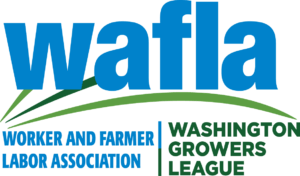Guest workers play a vital role in Washington agriculture. We should embrace them.
Guest workers play a vital role in Washington agriculture. We should embrace them.
Link to original op-ed in the Tri-City Herald
Link to op-ed published in the Olympian
Link to op-ed published in the News Tribune of Tacoma
Op-ed by Roxana Macias, wafla chief people and community officer
Growing up in Prosser, I witnessed firsthand the vital role migrant labor has played in our agricultural community. However, the landscape of farm labor has evolved significantly since my childhood. Back then, my family and I worked alongside other relatives, picking cherries or tending to row crops. It was a family affair, with multiple generations laboring for the same farmer. But today, the children of immigrants and migrant workers are often forging different paths, no longer following in their parents’ footsteps. This transformation in the composition of our farm labor force is reshaping not only the agricultural sector but also our communities.
My father, now a U.S. resident for 45 years, has often said, “If we had the option to work on an H-2A visa, we never would have had to leave Mexico.” This sentiment, often referred to affectionately as “Mexico lindo y querido” (“Beautiful and cherished Mexico”), resonates with many Mexican nationals who yearn for the opportunity to come to the United States, earn a better living, and still maintain strong ties to their homeland.
While the federal H-2A agricultural guest worker program could be improved, it undeniably offers immediate and life-changing benefits to workers. Having worked in seasonal visa processing for agricultural workers in Mexico, I’ve witnessed the sheer joy on workers’ faces when they receive their visas. They share inspiring stories of enrolling their children in better schools, buying homes, and even starting businesses – all made possible by the increased earning potential afforded by guest work in the United States.
With both a personal and professional perspective on the immigration changes in recent decades, I understand the significance of H-2A workers in Washington agriculture. These workers receive competitive wages, currently set at a minimum of $17.97 per hour, along with free housing, transportation and guaranteed contracts. These same benefits are extended to domestic workers who work alongside H-2A workers, creating a level playing field.
Certainly, these benefits come with sacrifices, including time spent away from family and the physically demanding nature of farm labor. Yet, most workers believe it’s worth it, which is why they return year after year. The contributions of these guest workers to our local economy and food supply are monumental, and their importance continues to grow as Washington increasingly relies on foreign labor to bring in the harvest.
It’s impossible to understate the importance of H-2A guest workers in meeting the seasonal labor demands of our farms. Last year, Washington farms offered over 33,000 seasonal farm jobs, as required by the federal H-2A program, and the state employment offices referred just 11 domestic laborers to fill those positions. Failure to bridge this labor gap would result in unpicked apples and economic hardship in our rural communities.
These guest workers are not entering the country illegally, nor are they taking jobs away from Americans. They are regular individuals striving to improve their lives and support their families, often returning to their home countries after the season to contribute positively to their communities.
At wafla, we firmly believe that farm workers are not mere employees but integral members of our communities and essential contributors to our economy. Without their tireless efforts, our state’s agriculture would suffer. As our population ages, the agriculture sector will increasingly rely on guest workers.
The days of insular, locally sourced farm labor from my childhood are gone. Farms that once depended on local migrant workers now struggle to find labor locally and depend on international migrant workers to supplement their workforce. To address this new economic reality, Congress must prioritize the modernization and streamlining of our broken, outdated immigration system. Such reforms will foster a mutually beneficial relationship between farmers and farmworkers while upholding dignity and respect for everyone in agriculture. It’s time to embrace this new era of guest workers, recognizing their pivotal role in our evolving agricultural landscape.
